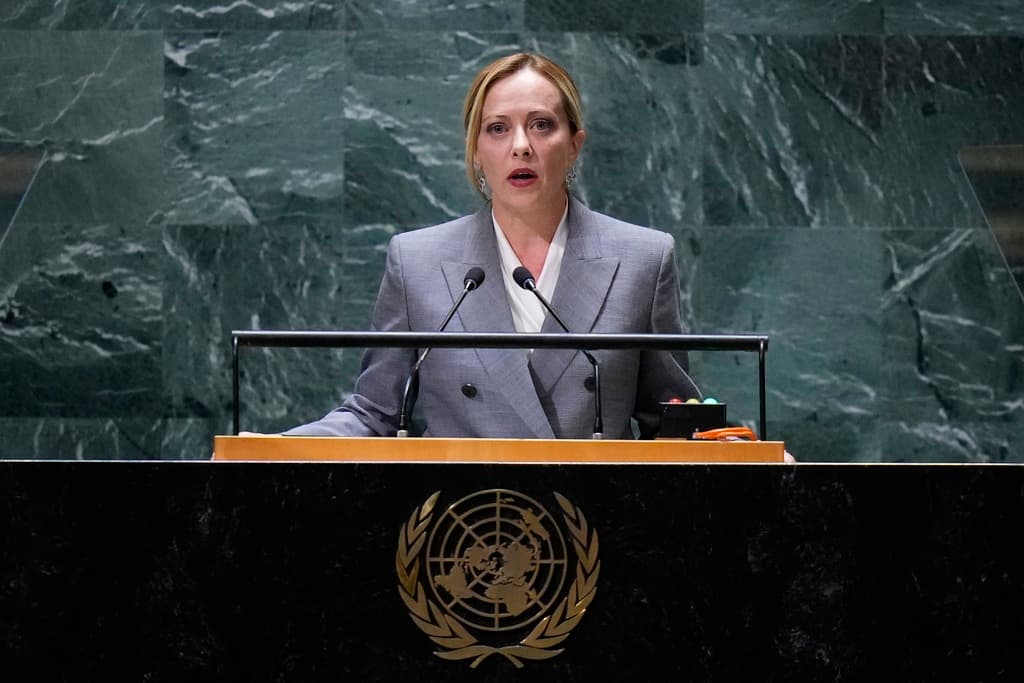Giorgia Meloni, Who Rose to Power on a Vow To Defend Italian Sovereignty, Snubs Biden and Turns to Crisis Over Migrants
Lampedusa — a sun-drenched Italian isle ’twixt Sicily and North Africa — has become a tinderbox that threatens the stability of Europe.

Ruthless smugglers are churning the waters of the Mediterranean, trafficking in human cargo. Lampedusa — a sun-drenched Italian isle ’twixt Sicily and North Africa — has become a tinderbox that threatens the stability of Europe. The population of Lampedusa is 6,000. Yet 7,000 illegal migrants recently landed on the island en masse, and 11,000 soon followed.
Over 127,000 refugees — that status is in dispute — have arrived in Italy this year alone. They have been exploited by contrabandists, criminals, and drug lords, yet not all of the migrants are true asylum seekers. The scale of the influx suggests an invasion that Italy cannot tolerate. Nor, it appears, will Italy countenance the fecklessness of fellow EU states.
The EU Commission president, Ursula von der Leyen, journeyed with Ms. Meloni to Lampedusa, urging EU nations to assist Italy by taking in such migrants. Yet the interior minister at Paris, Gerald Darmanin, declares that France “will not welcome” any of them. Indeed, French police blocked the borders between the two nations, tightening controls on trains between Ventimiglia and Cannes.
Even Germany wavered, suspending a program for the reallocation of migrants — until Ms. von der Leyen forcefully intervened. Ultimately, President Macron agreed with Senora Meloni to “shared action.” Ms. Von der Leyen pledged solidarity with the Italian premier, framing her steadfastness with il bel Paese as “a European solution to a European challenge.”
After witnessing the anguish of Lampedusa’s residents, Ms. von der Leyen promised that “You can count on the European Union.” Signora Meloni agreed that the task of combating illicit migration “should not be considered” Italy’s alone, “but the responsibility of Europe to itself.” She stressed how “the future of Europe depends on its ability to face great challenges.”
Ms. Meloni declared that she will not permit Italy to become “Europe’s refugee camp.” Having admonished would-be migrants to eschew the perilous journey across the Mediterranean, she warned that those found to be illegal will be “detained and repatriated.” To that end, Italy has greenlighted “extraordinary measures” to stem the tsunami of illegal migrants.
These include increasing the number of detention centers and expelling and repatriating unwanted aliens. Yet all options are on the table, including a naval blockade. Upholding Italy’s sovereignty is one of the planks of Ms. Meloni’s political program. Indeed, this vow fueled her rise to the premiership. So far, however, solving the migrant crisis has been arduous.
According to the director of the Heritage Foundation’s Margaret Thatcher Center for Freedom, Nile Gardiner, “the scale of the crisis is huge,” and while Ms. Meloni “is one of the toughest leaders in Europe on illegal migration,” the premier “is finding herself overwhelmed by the sheer scale of the crisis, and it’s only going to get worse.” Yet Signora Meloni’s gambit is a multi-layered one.
The North African nation of Tunisia is the point of embarkation for the majority of illegal migrants to Italy. Engendering market-driven prosperity there and elsewhere on the continent is doable, affordable, and necessary. It would go a long way to putting an end to what Ms. Meloni calls “la schiavitù del terzo millennio” — the “slavery of the third millennium.”
The Tunisian initiative that Ms. Melni forged with Ms. von der Leyen over the summer has yet to bear fruit, in part because the funds to engender economic growth and infrastructure revitalization haven’t been allotted. Yet the goal of uplifting the impoverished country’s material fortunes is a salutary one, one that applies to other African nations.
As Ms. Meloni detailed in her address to the General Assembly, halting the flow of illegal migration means assisting African nations to harness their many resources so as to grow their economies and raise the entire continent’s standard of living. Smugglers, traffickers and assorted evildoers will then be thwarted in their efforts to exploit human suffering.
Ms. Meloni’s greatest ally in this regard is Ms. von der Leyen, who has come to value the premier’s intellect and compassionate grit. However, Ms. Meloni’s conservative coalition partner, Matteo Salvini, is disdainful of the premier’s approach, preferring to dicker with France’s Marine Le Pen, no doubt in a bid to promote his Lega ahead of the European Parliament’s elections next year.
In addressing the crisis of illicit migration in Italy, Giorgia Meloni was too busy to meet with President Biden. Was her failure to confer with him during the UN General Assembly a deliberate snub? No, as the Italian premier outlined in her address, she is waging war on a new kind of slavery. Her resolve is a lesson for Mr. Biden, who ignores the calamity on his own southern border.

